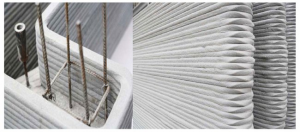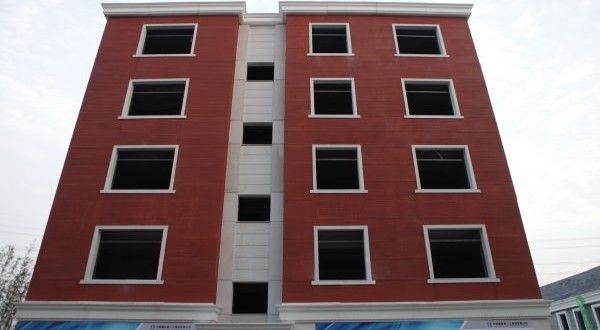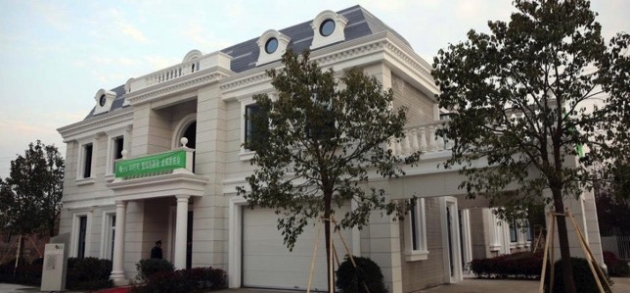Chinese Company Successfully Builds World's First 3D-Printed Apartment Building and Villa
Every since 3D printers first hit the scene in the past 5 years, architects around the globe have been pioneering the construction possibilities that could be brought to fruition with the right equipment. Meanwhile, a company in China by the name of WinSun was actively pursuing the goal of becoming the first company to successfully build 3-D printed dwellings.
Last year in March, WinSun succeeded in printing out 10 structurally safe houses in under 24 hours, using their proprietary 3D printer that lays down a mixture of industrial waste and ground construction materials to form a base around a quick drying cement that is combined with a special hardening agent.
The same company has now constructed a 3D-printed five-story apartment complex along with an 11,840 square foot villa. They even printed all of the decorative elements within the structures as well. The entire printed construction is currently on display at Suzhou Industrial Park.
Pictured Above: World's Tallest 3D-printed Apartment Building
Massive Printer Laying Buildings Like Icing on a Cake
 The 3D printer used in the construction was developed by Ma Yihe, an inventor of 3D printers with more than a decade experience in the field. The massive printer stood 6.6 metres in height, 10 metres in width, a 40 metres in length (or 20 x 33 x 122 ft.), and fabricated large components of the building at WinSun's facility.
The 3D printer used in the construction was developed by Ma Yihe, an inventor of 3D printers with more than a decade experience in the field. The massive printer stood 6.6 metres in height, 10 metres in width, a 40 metres in length (or 20 x 33 x 122 ft.), and fabricated large components of the building at WinSun's facility.
The printed parts were then transported to the construction site and assembled on-site, where steel reinforcement and insulation was also added in order to meet local building standards.
While the company has not yet given a statement to describe exactly how big their printed pieces can be, if the pictures on their website are any indication then it's obvious that this technology can be scaled to virtually any size.
WinSun uses CAD templates inputted into the machine to tell it how to lay the layers of building material, much in the same way that someone would layer icing on a cake. It's almost like laying special bricks, but instead of rectangular blocks, the material comes out in tubes. The walls are left hollow to provide room for insulation and to aid in reinforcement.
Saving Money, Time, Labor and Materials
The 3D-printing construction process saves approximately 30 to 60 percent of construction waste and is capable of decreasing construction times by up to 70 percent and labor costs by up to 80 percent. Furthermore, the process of assembling the printed materials is far less likely to expose construction workers to hazardous materials and noise.
By utilizing recycled materials, this construction method is not only environmentally friendly it is also highly-cost effective and time-efficient. Overall, the beautiful villa they built only cost $161,000 to construct. By contrast, such a large and decadent structure would like cost at least $250,000 with conventional methods and materials.
Who would have thought that thanks to 3D printing we could one day see massive construction machines that are capable of printing out and laying down entire neighborhoods of houses and robust condominiums in a matter of days.
WinSun has expressed interest in eventually scaling up their technology to produce larger structures like bridges and skyscrapers. It will be interesting to see how this technology will collaborate with the upcoming advent of holographic headsets (like Microsoft's HoloLens) in the architectural development process. We'll leave you with a picture of the three-story 3D-printed villa mansion that WinSun printed (in our opinion it is more impressive than the apartment building):


